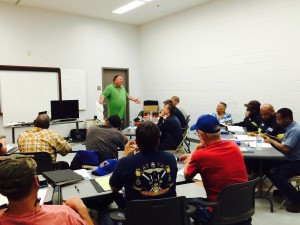
This course presents an introduction to operating vehicles using compressed natural gas (CNG). Students are required to gain an understanding of CNG, regulations, component and line fabrications, driver education requirements, and diagnostic testing components. Students will apply basic competencies to grasp in-depth workings of CNG vehicles.
The course also combines classroom instruction and theory with the opportunity to apply concepts through hands-on activities with the TFC’s active CNG service station. Students will be given the opportunity to learn and apply best-practices on a state-of-the art fleet. This course will emphasize testing at the end of each module prior to actively participating in active lab work. At the conclusion of the training participants will have satisfactorily completed 40 hours of training for the NFPA 52, CNG Theory, Safety, Troubleshooting and Diagnostics for Compressed Natural Gas vehicles for the 2013 NFPA standards.
There are 5 classes planned for 2017. Click on a class date to register for it!
February 6-10
April 10-14
June 5-9
September 11-15
December 4-8
Registration Fee: $1200 Includes all course materials and lunch each day.
MAJOR INSTRUCTIONAL AREAS
Theory and history of compressed natural gas
Installation and training with Swagelok products
System operation with Agility fuel systems
Understanding NFPA 52 Vehicular Gaseous Fuel Systems Code
Installing compressed natural gas components
Programming and calibrating compressed natural gas components
Diagnosis and troubleshooting
COURSE OBJECTIVES
Understand the history and theory of compressed natural gas as an alternative fuel source
Knowledge of alternative fuels technical definitions
Safety precautions relative to natural gas properties
Preparing for fuel system inspection
Correctly install tube fittings and end connections
Recognize the causes of leaks and troubleshoot issues correctly
Knowledge of the fuel system structure and components
Correct operation and maintenance of compressed natural gas-powered vehicles
Understand all of the NFPA 52 code information as it relates to compressed natural gas
Identify hardware requirements and software installation needs
Program and calibrate the vehicle engine control unit
Diagnose engine control unit errors and perform necessary injector testing
Correctly understanding schematics
Successfully complete the CSA America compressed natural gas certification examination
